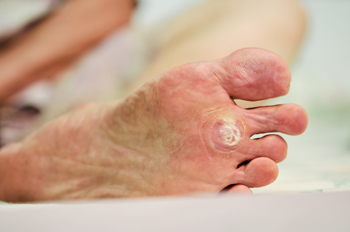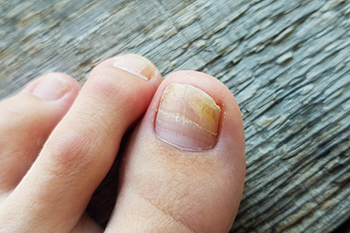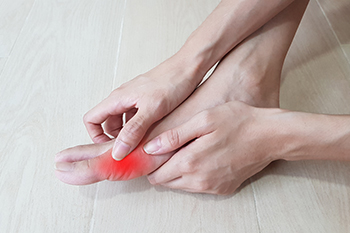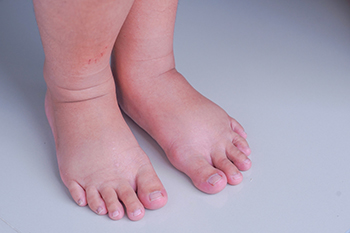
August 2023
Plantar Warts and Possible Treatments

Plantar warts are benign skin growths that appear on the soles of the feet caused by the human papillomavirus. These warts can be painful and discomforting, often characterized by small, grainy bumps with black dots in the center. The virus enters the skin through small cuts or abrasions and thrive in warm, moist environments like public showers and swimming pools. While plantar warts are generally harmless, they can be stubborn and challenging to eliminate without proper treatment. Over-the-counter remedies such as salicylic acid or freezing solutions may provide some relief but professional interventions that can include cryotherapy, laser therapy, or surgical removal may be necessary for complete eradication. To prevent plantar warts, it's crucial to maintain good foot hygiene, wear protective footwear in public areas, and avoid sharing personal items with others. If you have developed a plantar wart, it is suggested that you visit a podiatrist who can offer effective treatment options.
Plantar warts can be very uncomfortable. If you need your feet checked, contact Dr. Randy Garr from Bigfoot Podiatry. Our doctor will assist you with all of your foot and ankle needs.
About Plantar Warts
Plantar warts are the result of HPV, or human papillomavirus, getting into open wounds on the feet. They are mostly found on the heels or balls of the feet.
While plantar warts are generally harmless, those experiencing excessive pain or those suffering from diabetes or a compromised immune system require immediate medical care. Plantar warts are easily diagnosed, usually through scraping off a bit of rough skin or by getting a biopsy.
Symptoms
- Lesions on the bottom of your feet, usually rough and grainy
- Hard or thick callused spots
- Wart seeds, which are small clotted blood vessels that look like little black spots
- Pain, discomfort, or tenderness of your feet when walking or standing
Treatment
- Freezing
- Electric tool removal
- Laser Treatment
- Topical Creams (prescription only)
- Over-the-counter medications
To help prevent developing plantar warts, avoid walking barefoot over abrasive surfaces that can cause cuts or wounds for HPV to get into. Avoiding direct contact with other warts, as well as not picking or rubbing existing warts, can help prevent the further spread of plantar warts. However, if you think you have developed plantar warts, speak to your podiatrist. He or she can diagnose the warts on your feet and recommend the appropriate treatment options.
If you have any questions please feel free to contact our office located in Provo, UT . We offer the newest diagnostic and treatment technologies for all your foot and ankle needs.
Causes of Toenail Fungus

Toenail fungus, also known as onychomycosis, is a common and bothersome condition that affects millions of people worldwide. This fungal infection occurs when microscopic fungi, such as dermatophytes or yeast, penetrate the nail bed through small cuts or openings. The warm and damp environment inside closed-toe shoes provides an ideal breeding ground for the fungi to thrive. The infection often starts with a white or yellow spot under the nail and gradually spreads, causing the nail to become discolored, thickened, and brittle. Individuals with compromised immune systems, or who have diabetes or poor circulation are generally at a higher risk. Additionally, frequent exposure to moist environments, wearing tight-fitting shoes, or walking barefoot in public places may also increase the likelihood of developing toenail fungus. Early detection and proper treatment are essential in preventing the spread of the infection and can help restore healthy toenails. Toenail fungus can be treated by a podiatrist, and it is suggested that you contact this type of doctor for relief options that are correct for you.
If left untreated, toenail fungus may spread to other toenails, skin, or even fingernails. If you suspect you have toenail fungus it is important to seek treatment right away. For more information about treatment, contact Dr. Randy Garr of Bigfoot Podiatry. Our doctor can provide the care you need to keep you pain-free and on your feet.
Symptoms
- Warped or oddly shaped nails
- Yellowish nails
- Loose/separated nail
- Buildup of bits and pieces of nail fragments under the nail
- Brittle, broken, thickened nail
Treatment
If self-care strategies and over-the-counter medications does not help your fungus, your podiatrist may give you a prescription drug instead. Even if you find relief from your toenail fungus symptoms, you may experience a repeat infection in the future.
Prevention
In order to prevent getting toenail fungus in the future, you should always make sure to wash your feet with soap and water. After washing, it is important to dry your feet thoroughly especially in between the toes. When trimming your toenails, be sure to trim straight across instead of in a rounded shape. It is crucial not to cover up discolored nails with nail polish because that will prevent your nail from being able to “breathe”.
In some cases, surgical procedure may be needed to remove the toenail fungus. Consult with your podiatrist about the best treatment options for your case of toenail fungus.
If you have any questions, please feel free to contact our office located in Provo, UT . We offer the newest diagnostic and treatment technologies for all your foot care needs.
Four Stages of Gout

Gout is a type of arthritis that often affects the joints of the big toe, and is caused by the accumulation of uric acid crystals. There are four distinct stages of gout. The first stage, known as asymptomatic hyperuricemia, is characterized by high levels of uric acid in the blood without any noticeable symptoms. The second stage is acute gout that occurs when uric acid forms crystals which begin to deposit in the joints. This can lead to sudden and severe pain, swelling, and redness. If left untreated acute gout can progress to the third stage, known as intercritical gout, or the interval between gout attacks. During this phase, patients can experience periods of remission where symptoms subside, but it is essential to maintain proper management and lifestyle changes to prevent future flare ups. The final stage is chronic tophaceous gout, which occurs after repeated gout attacks. In this stage, large uric acid crystal deposits called tophi, can develop beneath the skin surrounding the joints and in other tissues. Tophi can lead to joint damage and deformities. Early detection and appropriate management are key to preventing the progression of gout. If you believe you have gout, it is suggested that you make an appointment with a podiatrist for treatment options.
Gout is a painful condition that can be treated. If you are seeking treatment, contact Dr. Randy Garr from Bigfoot Podiatry. Our doctor will treat your foot and ankle needs.
What Is Gout?
Gout is a form of arthritis that is characterized by sudden, severe attacks of pain, redness, and tenderness in the joints. The condition usually affects the joint at the base of the big toe. A gout attack can occur at any random time, such as the middle of the night while you are asleep.
Symptoms
- Intense Joint Pain - Usually around the large joint of your big toe, and it most severe within the first four to twelve hours
- Lingering Discomfort - Joint discomfort may last from a few days to a few weeks
- Inflammation and Redness -Affected joints may become swollen, tender, warm and red
- Limited Range of Motion - May experience a decrease in joint mobility
Risk Factors
- Genetics - If family members have gout, you’re more likely to have it
- Medications - Diuretic medications can raise uric acid levels
- Gender/Age - Gout is more common in men until the age of 60. It is believed that estrogen protects women until that point
- Diet - Eating red meat and shellfish increases your risk
- Alcohol - Having more than two alcoholic drinks per day increases your risk
- Obesity - Obese people are at a higher risk for gout
Prior to visiting your podiatrist to receive treatment for gout, there are a few things you should do beforehand. If you have gout you should write down your symptoms--including when they started and how often you experience them, important medical information you may have, and any questions you may have. Writing down these three things will help your podiatrist in assessing your specific situation so that he or she may provide the best route of treatment for you.
If you have any questions, please feel free to contact our office located in Provo, UT . We offer the newest diagnostic and treatment technologies for all your foot care needs.
Definition and Causes of Achilles Tendon Injuries

The world of Achilles tendon injuries is common among athletes across the globe. The Achilles tendon is the band of tissue connecting the calf muscles to the heel bone, enabling us to walk, jump, and run. Achilles tendon injuries are described as tears or strains that happen to this crucial tendon. These injuries can be mild, causing discomfort, or severe pain, possibly causing difficulty in walking. A common cause of an Achilles tendon injury can be from overuse. This can range from increasing speed and mileage too quickly while running to not getting adequate rest. Wearing improper footwear, such as flip-flops during sporting activities, can also contribute to this painful condition. Additionally, sudden increases in physical activity or tight calf muscles may put stress on the Achilles tendon, leading to injuries. Effective prevention techniques can include stretching, wearing suitable shoes, and listening to your body's limits. If you have endured this type of injury, it is suggested that you visit a podiatrist sooner rather than later who can provide you with relief solutions.
Achilles tendon injuries need immediate attention to avoid future complications. If you have any concerns, contact Dr. Randy Garr of Bigfoot Podiatry. Our doctor can provide the care you need to keep you pain-free and on your feet.
What Is the Achilles Tendon?
The Achilles tendon is a tendon that connects the lower leg muscles and calf to the heel of the foot. It is the strongest tendon in the human body and is essential for making movement possible. Because this tendon is such an integral part of the body, any injuries to it can create immense difficulties and should immediately be presented to a doctor.
What Are the Symptoms of an Achilles Tendon Injury?
There are various types of injuries that can affect the Achilles tendon. The two most common injuries are Achilles tendinitis and ruptures of the tendon.
Achilles Tendinitis Symptoms
- Inflammation
- Dull to severe pain
- Increased blood flow to the tendon
- Thickening of the tendon
Rupture Symptoms
- Extreme pain and swelling in the foot
- Total immobility
Treatment and Prevention
Achilles tendon injuries are diagnosed by a thorough physical evaluation, which can include an MRI. Treatment involves rest, physical therapy, and in some cases, surgery. However, various preventative measures can be taken to avoid these injuries, such as:
- Thorough stretching of the tendon before and after exercise
- Strengthening exercises like calf raises, squats, leg curls, leg extensions, leg raises, lunges, and leg presses
If you have any questions please feel free to contact our office located in Provo, UT . We offer the newest diagnostic tools and technology to treat your foot and ankle needs.
It's Time for Beautiful Feet
Reasons Why the Feet Can Swell

Swollen feet are a common foot condition. There are several causes of swollen feet, and relief may be found when determining the source of the problem. Lifestyle factors may contribute to getting swollen feet, which can range from eating habits to pregnancy. Some patients are afflicted with chronic venous insufficiency, which is a condition that limits blood flow from the feet to the heart. Having swollen feet may also characterize an infection and can be common among diabetic patients. Serious ailments involving blood clots can be known to cause swollen feet and ankles, and immediate medical attention is often sought. Additionally, swollen feet may indicate heart disease, which may cause the blood to back up and pool in the feet and ankles. If you have swollen feet, it is strongly suggested that you are under the care of a podiatrist who can effectively treat this condition.
Swollen feet can be a sign of an underlying condition. If you have any concerns, contact Dr. Randy Garr of Bigfoot Podiatry. Our doctor can provide the care you need to keep you pain-free and on your feet.
Swollen feet are a common ailment among pregnant women and people who stand or sit for extended periods. Aging may increase the possibility of swollen feet and patients who are obese often notice when their feet are swelling too. There may be medical reasons why swollen feet occur:
- Phlebitis - A condition that causes the veins to become inflamed and can also cause leg pain.
- Liver disease - This may lead to low blood levels of albumin which is a protein. This can cause fluid in the blood to pass into the tissues and several areas of the body can become swollen.
- Heart failure - When the heart doesn’t pump properly the blood that is normally pumped back to the heart can pool in the veins of the legs causing swollen feet.
- Kidney disease - One of the main functions of the kidneys is releasing excess fluid in the body. This type of condition can make it difficult for the kidneys to function properly, and as a result the feet may become swollen.
- Deep-vein thrombosis (DVT)- This is a serious condition where blood clots form in the veins of the legs. They can block the return of blood from the legs to the heart which may cause the feet to swell. It is important to be treated by a podiatrist if this condition is present.
Swollen feet can also be caused by bone and tendon conditions, including fractures, arthritis, and tendinitis. Additionally, there may be skin and toenail conditions and an infection may cause the feet to swell. Patients who take medicine to treat high blood pressure may be prone to getting swollen feet.
Many patients elevate their feet to help relieve the swelling and this is generally a temporary remedy. When a podiatrist is consulted the reason behind the swelling can be uncovered and subsequently treated.
If you have any questions please feel free to contact our office located in Provo, UT . We offer the newest diagnostic tools and technology to treat your foot and ankle needs.





